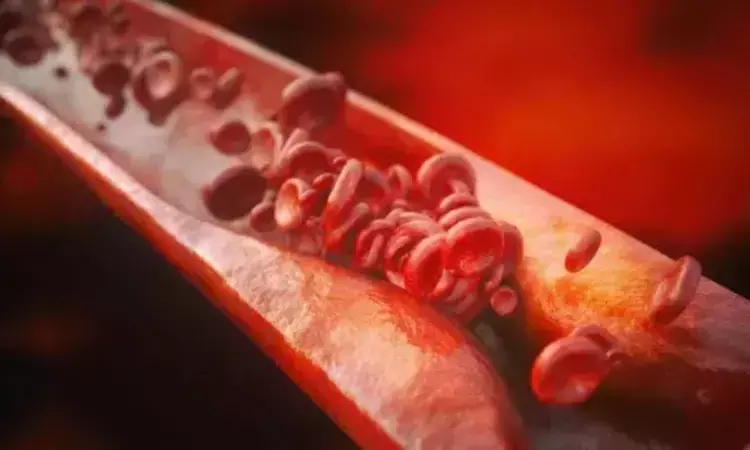- Home
- Medical news & Guidelines
- Anesthesiology
- Cardiology and CTVS
- Critical Care
- Dentistry
- Dermatology
- Diabetes and Endocrinology
- ENT
- Gastroenterology
- Medicine
- Nephrology
- Neurology
- Obstretics-Gynaecology
- Oncology
- Ophthalmology
- Orthopaedics
- Pediatrics-Neonatology
- Psychiatry
- Pulmonology
- Radiology
- Surgery
- Urology
- Laboratory Medicine
- Diet
- Nursing
- Paramedical
- Physiotherapy
- Health news
- Fact Check
- Bone Health Fact Check
- Brain Health Fact Check
- Cancer Related Fact Check
- Child Care Fact Check
- Dental and oral health fact check
- Diabetes and metabolic health fact check
- Diet and Nutrition Fact Check
- Eye and ENT Care Fact Check
- Fitness fact check
- Gut health fact check
- Heart health fact check
- Kidney health fact check
- Medical education fact check
- Men's health fact check
- Respiratory fact check
- Skin and hair care fact check
- Vaccine and Immunization fact check
- Women's health fact check
- AYUSH
- State News
- Andaman and Nicobar Islands
- Andhra Pradesh
- Arunachal Pradesh
- Assam
- Bihar
- Chandigarh
- Chattisgarh
- Dadra and Nagar Haveli
- Daman and Diu
- Delhi
- Goa
- Gujarat
- Haryana
- Himachal Pradesh
- Jammu & Kashmir
- Jharkhand
- Karnataka
- Kerala
- Ladakh
- Lakshadweep
- Madhya Pradesh
- Maharashtra
- Manipur
- Meghalaya
- Mizoram
- Nagaland
- Odisha
- Puducherry
- Punjab
- Rajasthan
- Sikkim
- Tamil Nadu
- Telangana
- Tripura
- Uttar Pradesh
- Uttrakhand
- West Bengal
- Medical Education
- Industry
ESC/EACTS recommends adjusting PCI for left main CAD in low surgical risk patients

Italy: A European task force comprised of cardiologists, interventionalists, and cardiac surgeons from the European Society of Cardiology (ESC) and European Association for Cardio-Thoracic Surgery (EACTS) is proposing changes to the guidelines for percutaneous coronary intervention (PCI) in patients with left main coronary artery disease (CAD) as published in European Heart Journal by Robert A Byrne and colleagues. The task force suggests that PCI for stable patients with left main CAD and a low or intermediate SYNTAX score (0-32) should be classified as a class IIa (level of evidence A) recommendation, rather than the current class I recommendation for those with a low SYNTAX score (0-22).
Key points from the task force's recommendations:
Adjustment in PCI Recommendation: The task force proposes that PCI for low surgical risk patients with left main CAD and a low or intermediate SYNTAX score should be considered a class IIa recommendation. This change aligns with PCI recommendations for low and intermediate SYNTAX scores.
The controversy over the optimal approach to treat patients with left main CAD emerged several years ago, fueled by concerns over all-cause mortality rates associated with PCI. The ESC formally requested an independent review of published trials, which concluded there was no significant difference in death rates between PCI and surgery at 5 years.
The task force underlines the importance of the heart team when deciding on the best revascularization strategy for left main CAD patients. The heart team, comprising cardiologists, interventionalists, and cardiac surgeons, plays a central role in ensuring patients receive appropriate care.
Although these recommendations represent a suggested change rather than formalised guidelines, they highlight ongoing efforts to refine treatment approaches for patients with left main CAD. The task force's work aims to ensure that patients receive the most suitable care, emphasizing collaboration among different specialities to achieve the best outcomes.
It's important to note that the task force's recommendations are based on an extensive review of contemporary trials and meta-analyses, but future updates to the ESC guidelines will include input from a wider range of stakeholders, including the European Association of Percutaneous Cardiovascular Interventions (EAPCI) and other associations.
The goal of these efforts is to continue improving patient care and outcomes for individuals with left main CAD, ensuring that the chosen revascularization strategy is tailored to each patient's specific needs. This cooperative approach emphasizes the importance of teamwork and collaboration among healthcare professionals to provide the best possible care for patients.
Reference:
Byrne RA, Fremes S, Capodanno D, et al. 2022 joint ESC/EACTS review of the 2018 guideline recommendations on the revascularization of left main coronary artery disease in patients at low surgical risk and anatomy suitable for PCI or CABG. Eur Heart J. 2023;Epub ahead of print. https://www.tctmd.com/news/esceacts-task-force-recommends-downgrading-pci-left-main-cad
Dr Kamal Kant Kohli-MBBS, DTCD- a chest specialist with more than 30 years of practice and a flair for writing clinical articles, Dr Kamal Kant Kohli joined Medical Dialogues as a Chief Editor of Medical News. Besides writing articles, as an editor, he proofreads and verifies all the medical content published on Medical Dialogues including those coming from journals, studies,medical conferences,guidelines etc. Email: drkohli@medicaldialogues.in. Contact no. 011-43720751


